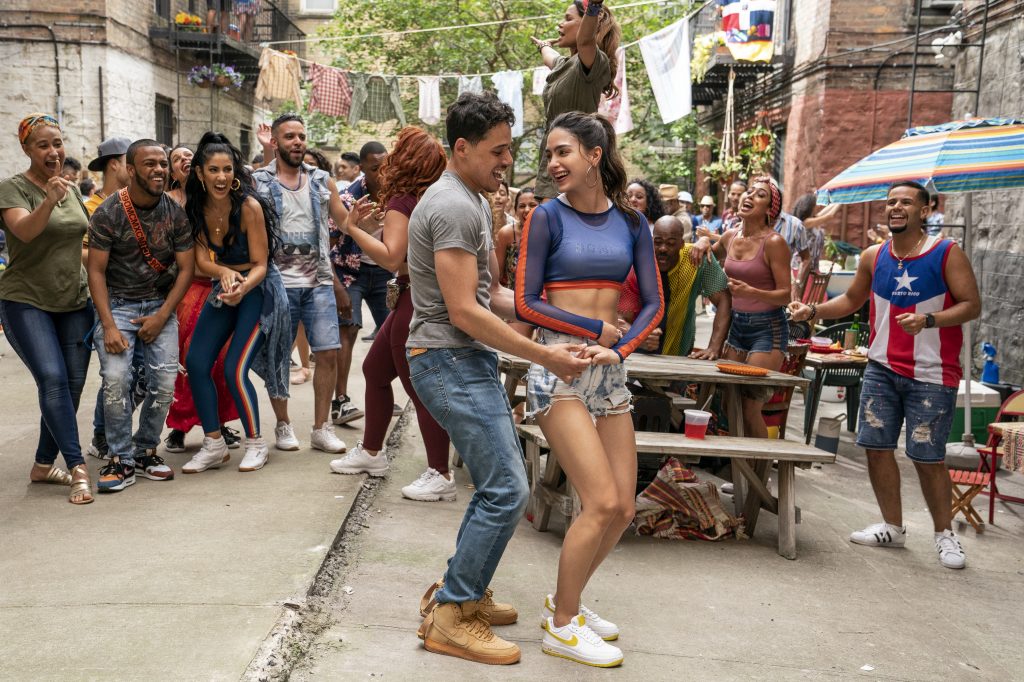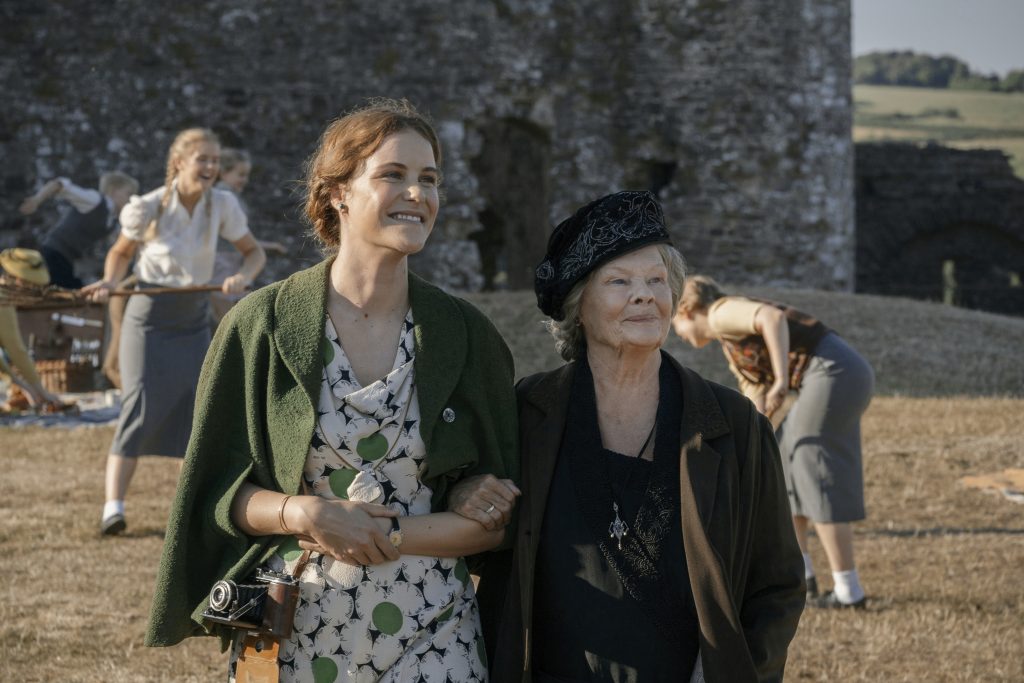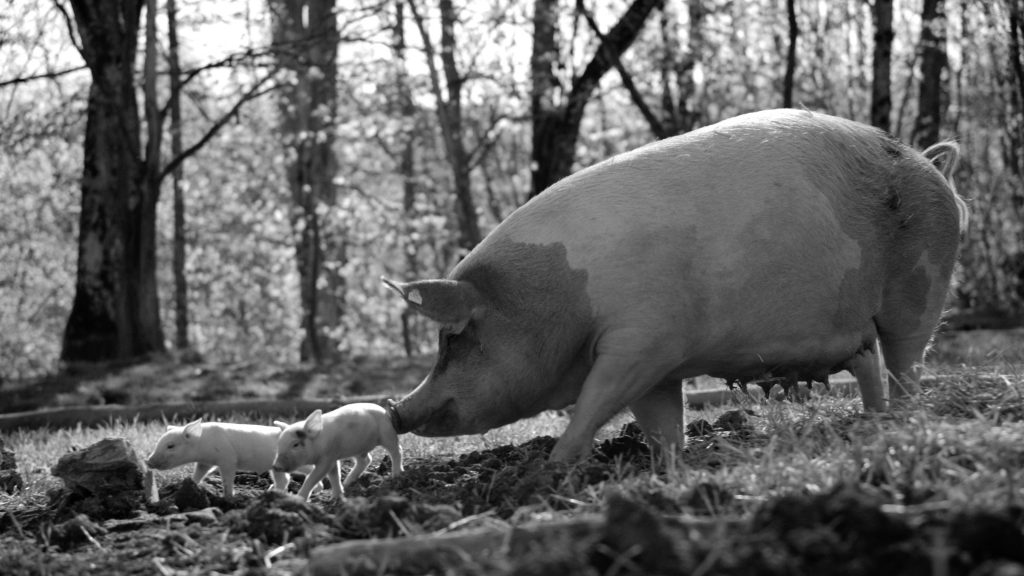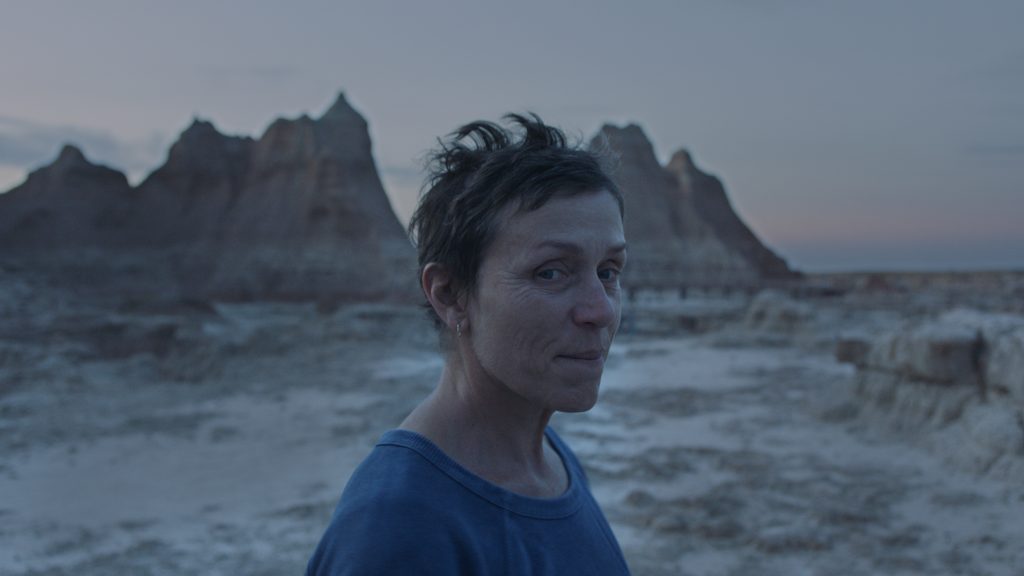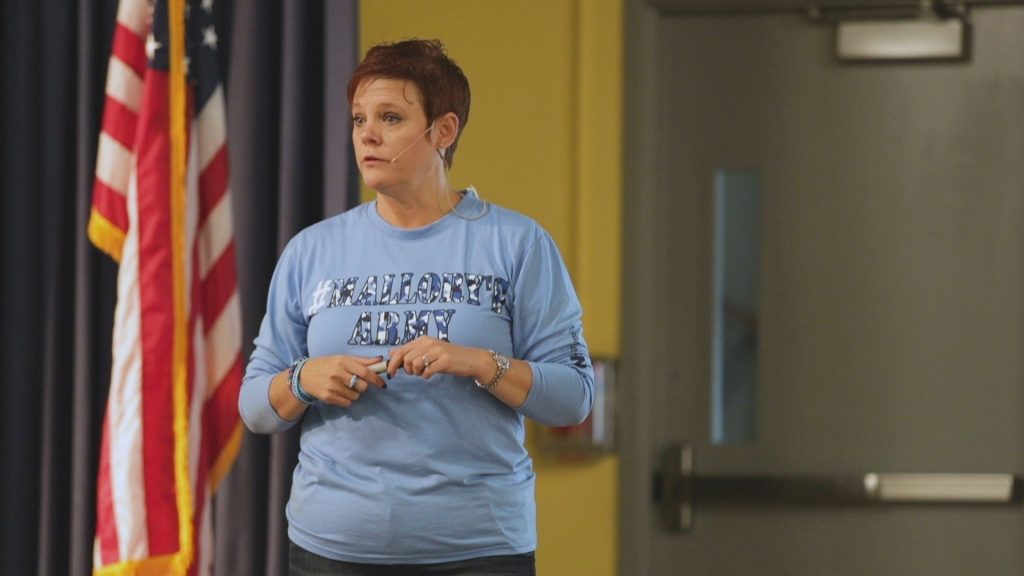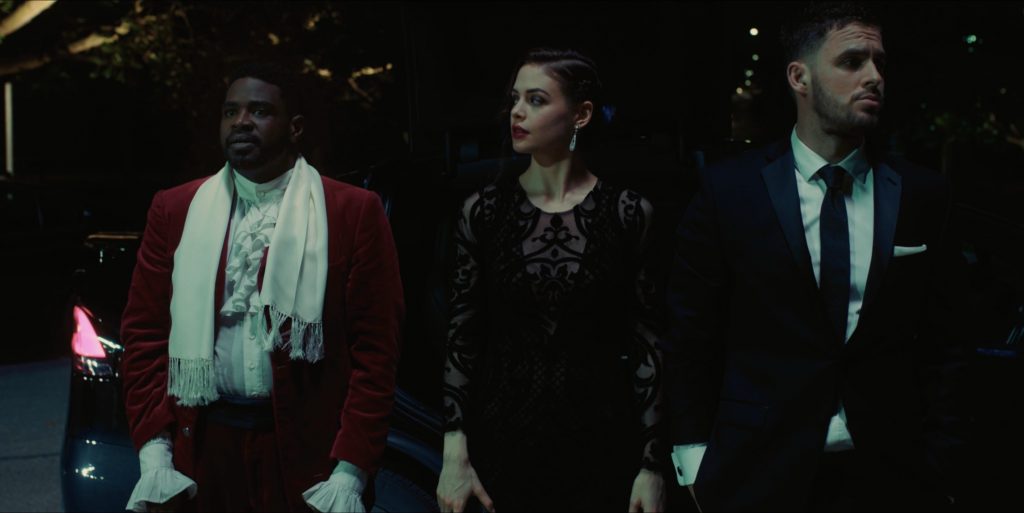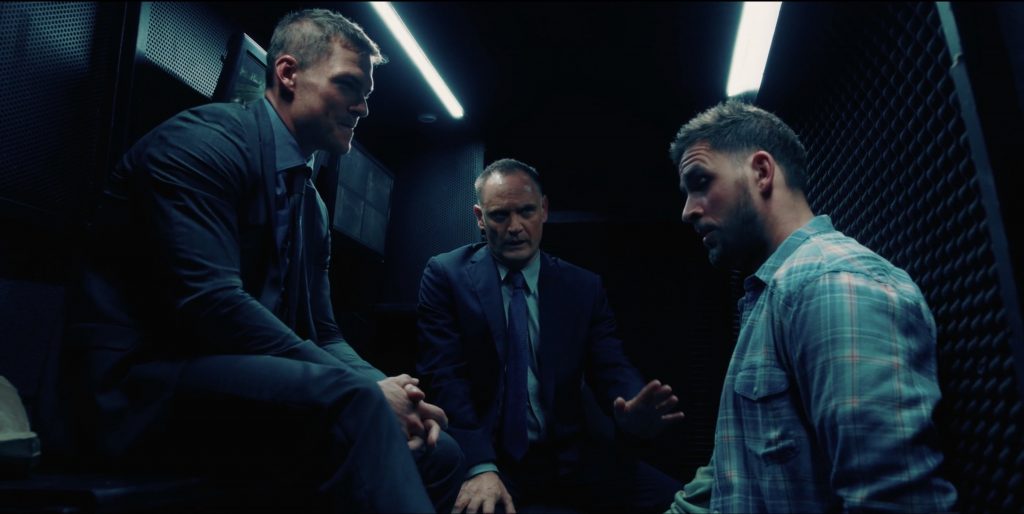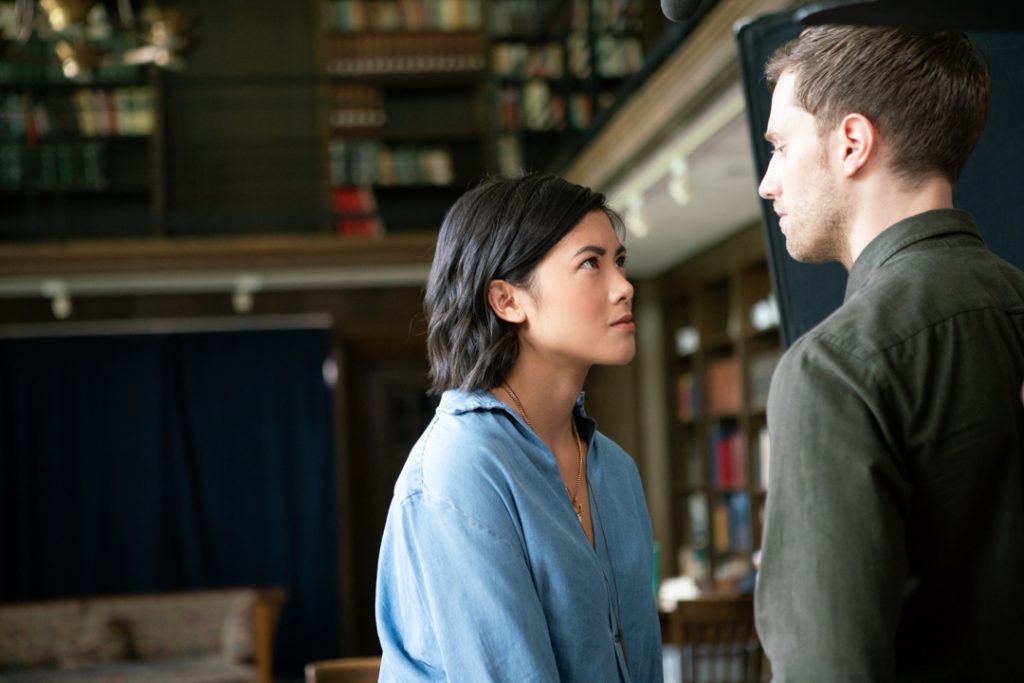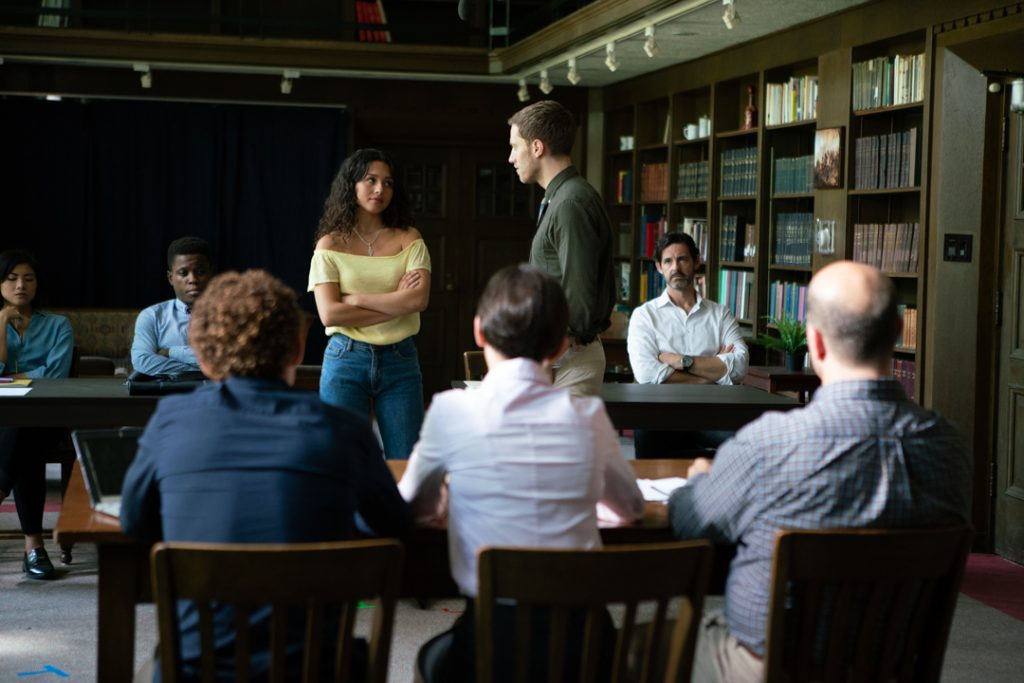April 16, 2021
by Carla Hay
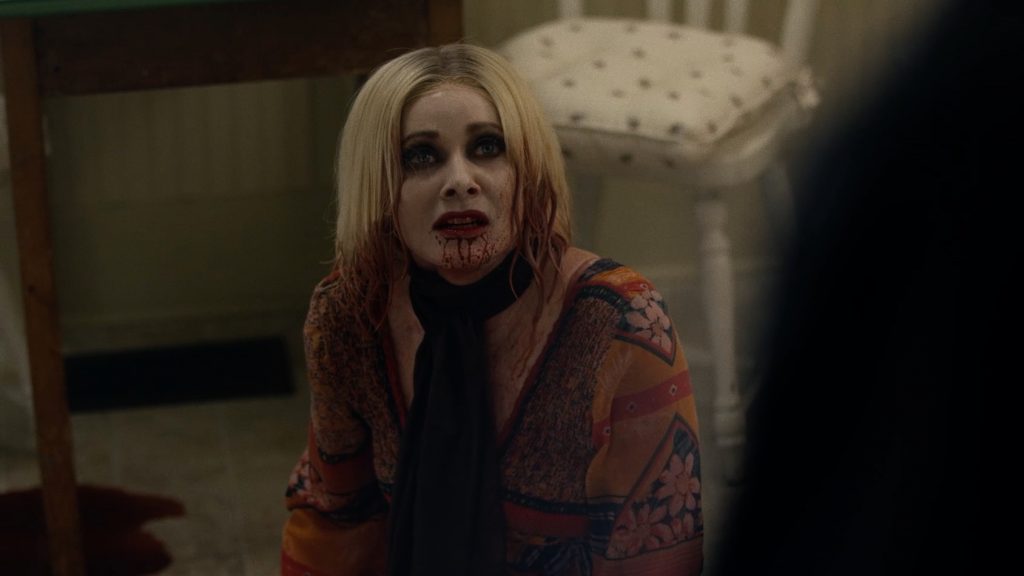
Directed by Travis Stevens
Culture Representation: Taking place in an unnamed U.S. city, the horror flick “Jakob’s Wife” features a predominantly white cast of characters (with some African Americans and one Latino) representing the middle-class.
Culture Clash: A minister’s housewife, who’s bored with her marriage, becomes a vampire.
Culture Audience: “Jakob’s Wife” will appeal primarily to people who are interested in horror movies that mix bloody gore with campy comedy.
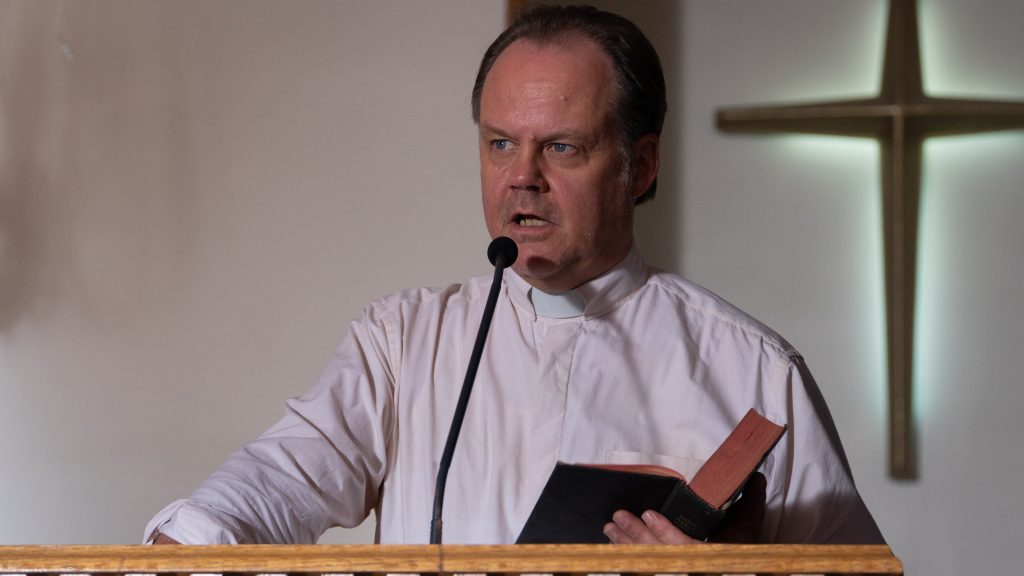
“Jakob’s Wife” is a memorable vampire flick that serves up a hilariously enjoyable blend of campy horror and gruesome chills, with a dash of female empowerment. The movie isn’t for people who hate the sight of blood. (It’s a vampire movie for adults. What do you expect?) But for people who can handle all the over-the-top gory mayhem in the story, then “Jakob’s Wife” might be your bloody cup of tea.
There are many predictable routes that a vampire movie can take. “Jakob’s Wife” takes some of those routes (for example, the title character’s transformation into a vampire follows the usual conventions of blood lust), but then the movie takes some unexpected and wacky detours. “Jakob’s Wife” director Travis Stevens, who co-wrote the movie’s screenplay with Kathy Charles and Mark Steensland, revels in the movie’s low-budget aura and makes sure that viewers know that this movie is not taking itself seriously at all. “Jakob’s Wife” had its world premiere at the 2021 South by Southwest (SXSW) Film Festival.
The title character of “Jakob’s Wife” is Anne Fedder (played by Barbara Crampton), the dutiful spouse of a minister named Jakob Fedder (played by Larry Fessenden), her husband of about 30 years. Anne and Jakob, who do not have children, live in an unnamed small town in the United States. They are Christian, but their specific religion is not mentioned in the movie.
The movie’s opening scene takes place during a church service that Jakob is conducting. He tells the parishioners during his sermon that men should respect their wives because it’s a reflection of how husband feel about themselves. “He who loves his wife loves himself,” intones Jakob.
Jakob is not secretly a hypocrite who abuses his wife. He loves Anne and he treats her very well. Anne hasn’t fallen completely out of love with Jakob, but their marriage has become boring to her. It’s implied that their sexual intimacy has decreased significantly. Jakob is devoted to his work at the church, while Anne spends her days doing workout routines and gardening.
In the movie’s opening scene at the church service, one of the parishioners approaches Jakob and tells him, “It was a beautiful service.” Her name is Amelia Humphries (played by Nyisha Bell), and she’s about 16 to 18 years old. Anne notices that Amelia’s mother Lucy, who is a regular churchgoer, is not with with Amelia.
Anne asks Amelia where her mother is, and Amelia says with some sadness and embarrassment that her mother couldn’t be there because Lucy started drinking again. Amelia adds, “I’m praying for her happiness.” Anne and Jakob express their sympathies.
While Amelia is walking home at night by herself, she’s startled to see some rats crawling around at her feet. She quickly walks away but not long after that, someone with vampire-type hands grabs her from behind. It won’t be the last time that viewers see Amelia.
Not long afterward, Amelia is reported missing. Anne and Jakob have dinner at their house with Jakob’s brother Bob (played by Mark Kelly) and Bob’s wife Carol (played by Sarah Lind). The topic of Amelia’s disappearance comes up in the conversation.
Everyone except Anne seems to think that it’s likely that Amelia ran away. Anne is skeptical of that theory because she thinks Amelia was too close to her mother Lucy to suddenly abandon her. Of course, viewers who know that “Jakob’s Wife” is a vampire movie can easily predict what happened to Amelia.
Over this family dinner, the discussion also includes Anne’s involvement in a construction project that she thinks will be good for their town. She’s apparently part of the town’s Historical Society, which had to approve this project because it’s being built on historical land. The project will be an abandoned mill that is going to be turned into a retail space.
Anne comments that the Historical Society thinks the new retail space will provide tourism and jobs. Jakob is leery of the project because he doesn’t think that anything commercial should be built on this historical land. But there’s probably another reason why Jakob is uneasy about this construction job.
It just so happens that the interior designer for the space is an ex-boyfriend of Anne’s named Tom Lewis (played by Robert Russler), and they haven’t seen each other in years. Jakob calls Tom an “old flame” of Anne’s, while she downplays the relationship that she had with Tom, by saying that they were “just kids” when she and Tom dated each other.
Anne and Tom have agreed to meet for dinner at a restaurant to discuss the construction project. Judging by the way Anne gets ready for the dinner, she wants to look very attractive for this meeting and she might have some unresolved has feelings for Tom. When Anne and Tom see each other again, they can’t help but notice they’ve still got chemistry with each other.
It soon becomes clear that Tom had a “bad boy” reputation when he dated Anne. She comments to him that he was “uncontrollable” in those days. Meanwhile, Tom says to Anne about how she’s changed since he last saw her.
“You a church mouse?” Tom declares with surprise. “What happened to the adventurous Anne who wanted to travel to exotic places?” Anne replies, “You make plans for things and then life happens. It was around the time that you left town that my mother died, and Jakob was there for me.”
Anne continues, “He offered me comfort—and so did the church. They were both steady when I needed support. Make no mistake—we have a good life. I’m happy.” Tom seems to accept that explanation.
But on another day, when Anne and Tom are at the abandoned mill where the new construction will take place, it’s revealed that this was also a place where Anne and Tom had romantic trysts when they were dating each other. Tom brings it up and Anne says she hasn’t forgotten. It should come as no surprise that Anne and Tom start kissing each other.
What happens next at this abandoned mill leads to Anne becoming a vampire. Will Anne have an extramarital affair with Tom? Will Jakob find out that she’s a vampire? And how will Anne satisfy her cravings for blood? All of those questions are answered in the movie.
Anne finds out early during her turning into a vampire that animal blood won’t work for her. There’s a comical scene of her going to the butcher section of a grocery store and asking the butcher (played by Skeeta Jenkins) if she could just buy the blood from the meat. When she gets home and drinks the blood like someone would drink wine or martinis, she discovers that the animal blood actually makes her sick. And yes, there’s a nauseating scene where she vomits up blood like a garden hose on full blast.
People who watch “Jakob’s Wife” should know that the movie is very enthusiastic about showing a lot of blood and bile gushing from bodies of humans and animals. This isn’t the type of vampire movie where a vampire gives neck bites with the minimum amount of blood drainage. No, in “Jakob’s Wife,” the people who get bitten by a vampire have enough blood spewing out of them to fill buckets.
The movie gets chillingly creative in a scene where Anne visits her dentist Dr. Meda (played by Monica L. Henry) for a routine checkup. The doctor notices that Anne has new teeth (that look like baby fangs) growing inside her back teeth. And when an automatic teeth-cleaning device is put on Anne’s mouth, it leads to one of the more horrifying yet intentionally hilarious scenes in the movie.
There’s a lot of crude dialogue that’s also meant to comedic. It’s enough to say that Anne isn’t the only vampire in the story. During an attack by one of the other vampires, this bloodsucker growls to the intended victim: “I’m going to tongue fuck a hole in your head until I puke blood!”
And later, a bratty neighborhood girl (played by Armani Desirae), who’s about 8 or 9 years old, sees Anne acting suspiciously in Anne’s front yard. The girl refuses to leave because she says she wants to learn a new curse word. Anne tells the girl, “Fuck off!” And the girl replies, “I already know that one!” It’s an example of some of the off-the-wall humor in the movie.
Early on in the movie, Jakob scolds two teenagers who are smoking a joint on the hood of his car that’s parked outside the church. One of the teens, whose name is Oscar (played by Omar Salazar) angrily talks back to Jakob, while Oscar’s female friend Eli (Angelie Simone, also known as Angelie Denizard) tries to calm him down and de-escalate the situation. Jakob ends up confiscating the marijuana joint, which shows up later in one of the movie’s comedic scenes.
Where there’s a vampire plague, there’s also a vampire leader. And in “Jakob’s Wife,” that leader is called The Master (played by Bonnie Aarons), who looks like an androgynous Nosferatu type of vampire. The way this creature looks isn’t fully revealed until a certain point in the movie. The Master keeps appearing near Anne and Jakob’s house and ends up having a big moment in the movie that’s one of the highlights of the film.
The cast members of “Jakob’s Wife” lean into their roles with gusto. All of the characters are well-cast, and Crampton’s performance sets the right level of tongue-in-cheek tone (or bite-in-neck tone, as it were) that makes the movie so entertaining to watch. (Crampton is one of the movie’s producers.) And even when there are some horror movie tropes, such as take-charge Sheriff Mike Hess (played Jay DeVon Johnson) and his bumbling Deputy Colton (played by C.M. Punk), there’s enough satire for viewers to know that everyone is in on the joke.
What also makes “Jakob’s Wife” better than the average horror film is that the movie’s characters aren’t complete stereotypes. Jakob isn’t as dull and uptight as people might think he is on first impression. Anne doesn’t become an evil vampire, because she’s someone who struggles with having to adjust to this drastic change in her life.
The movie’s musical score by Tara Busch doesn’t conform to the expected norms of a horror movie that’s about a middle-aged woman who becomes a vampire. Normally, a movie like this would have the usual Gothic scary music or have soundtrack cues using songs that were popular during this middle-aged woman’s youth. Instead, “Jakob’s Wife” is heavy with interludes of modern electronica music that sounds spooky at the same time. It’s almost as if to conjure up images that this minister’s wife could end up at an underground dance club now that she’s a vampire. It should come as no surprise that Anne’s lusty side is awakened, as she takes full control of her sexuality during her metamorphosis.
Underneath all the blood spatter and violent mayhem, “Jakob’s Wife” also has a message of finding one’s identity in the strangest of circumstances. Is it bizarre that a woman finally figures out how to be a strong and independent person only after she becomes a vampire? This movie doesn’t seem to think it’s so far-fetched, and in fact celebrates this transformation. And if the new Anne could change the title of the movie, she’d change it from “Jakob’s Wife” to “Anne the Vampire Warrior.”
RLJE Films and Shudder released “Jakob’s Wife” in select U.S. cinemas and on digital and VOD on April 16, 2021.

